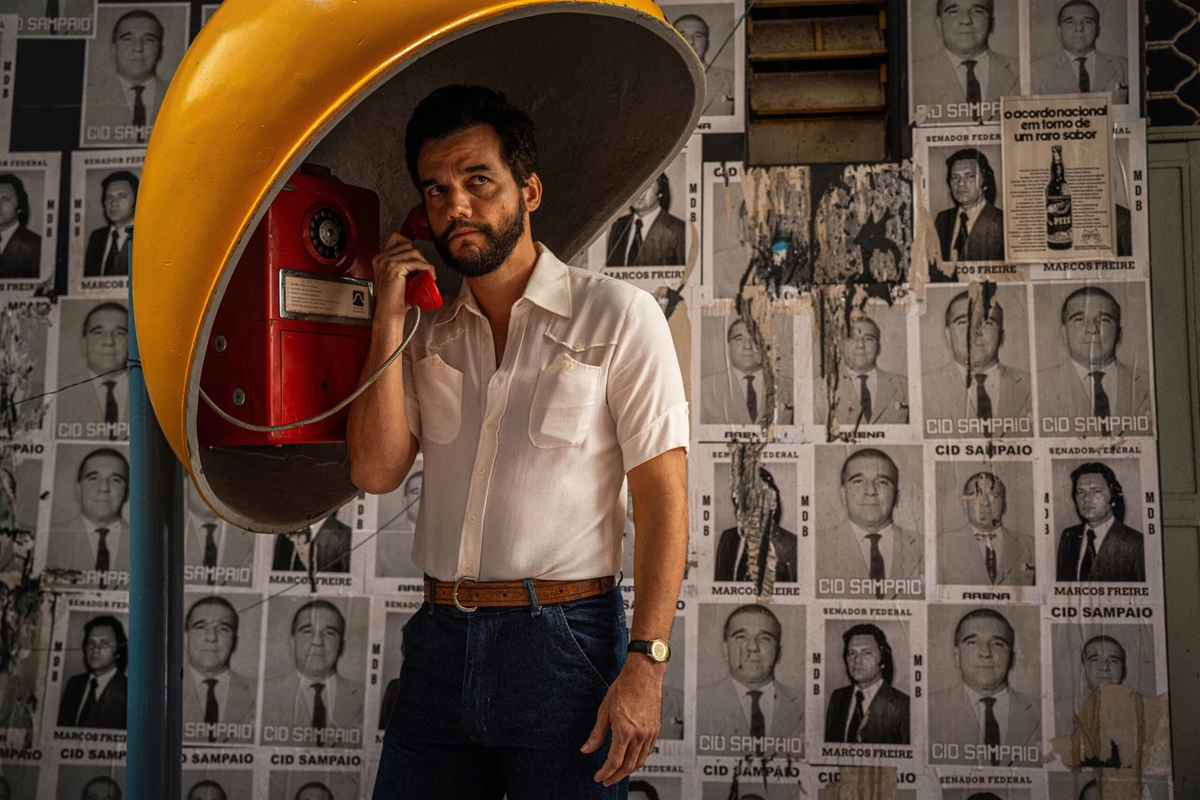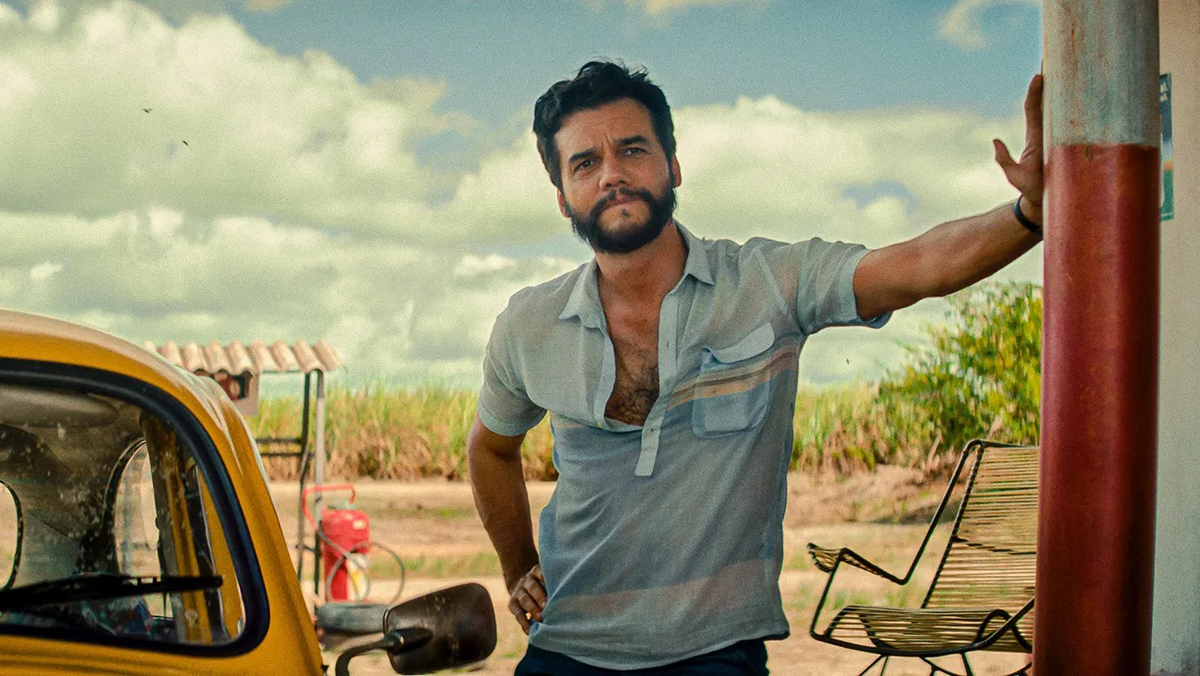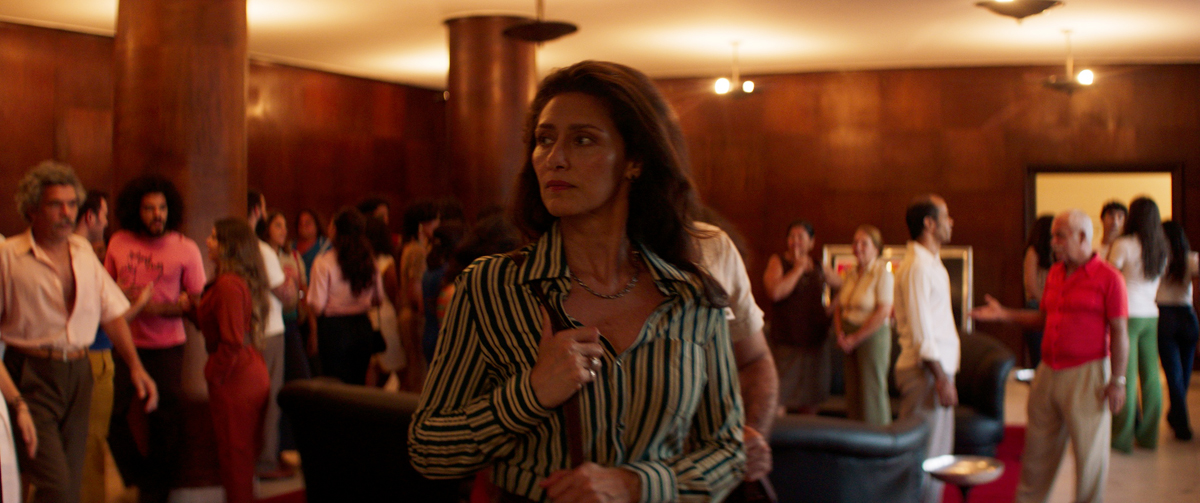 Melissa Anderson
Melissa Anderson
’70s cinema homages, ’70s mustaches, ’70s dictatorship repression: Kleber Mendonça Filho’s latest mixes high-energy excitement with
the ghosts of the past.

Wagner Moura as Marcelo in The Secret Agent. Courtesy Neon.
The Secret Agent, written and directed by Kleber Mendonça Filho, opening in theaters November 26, 2025
• • •
Before making movies, Kleber Mendonça Filho wrote about them, and nearly all of the Brazilian filmmaker’s features since his 2012 breakthrough, Neighboring Sounds, bear traces of his cinephilic passions. Aquarius (2016), for example, is a star vehicle for Sônia Braga, among Brazil’s most luminous screen legends. That deity also has a small role in the near-future phantasmagoria Bacurau (2019), a film codirected with Juliano Dornelles that includes a sly salute to genre-cinema godhead John Carpenter, who contributed a composition to the soundtrack. Mendonça’s 2023 documentary Pictures of Ghosts presents a history of Recife, his hometown, through the movie theaters that once stood there—the sacred sites where young Kleber, born in 1968, found his calling.
Nominally a political thriller, The Secret Agent forms an oblique diptych with Pictures of Ghosts; Mendonça’s zippy, agile latest situates key scenes inside a Recife movie palace. Both films are haunted by the past: set in 1977, well into the second decade of the military dictatorship that ruled Brazil from 1964 to 1985, The Secret Agent abounds with corpses and specters. It also teems with charismatic performers and indelible faces—mugs that effortlessly recall those from the decade rendered.

Wagner Moura as Marcelo in The Secret Agent. Courtesy Neon.
So spellbinding that he constitutes his own magnetic field, Wagner Moura plays the protagonist, who, for much of the film, we know as Marcelo, an alias. The reasons behind this assumed name are slowly parceled out through The Secret Agent—including in one bravura flashback that owes much to Nicolas Roeg’s analeptic set pieces in his ’70s touchstones Don’t Look Now and The Man Who Fell to Earth. The film’s opening scene immediately establishes Marcelo’s assured yet laid-back virility. Emerging from his banana-yellow VW Beetle at a dusty wayside Esso station, he sports prodigious facial and chest hair—and a nonplussed expression when he spots a days-old dead body, haphazardly covered with cardboard, lying several meters away from the pump. “Don’t worry about that,” the attendant (Joálisson Cunha, a mountainous man who impresses with his short shorts and even more ill-fitting spectacles) assures him. The cops, it seems, have been too busy roughing up (and worse) Carnival celebrants to tend to the corpse. When two police officers—one with a splotch of blood on his uniform shirt—do arrive at the station, the carcass is pointedly ignored; they’re interested only in Marcelo, whom they try to intimidate with a sham car search and then attempt to shake down for cash. He keeps his cool and offers them his last cigarettes. He drives off to Recife, the radio turned up for Chicago’s soft-rock anthem “If You Leave Me Now” (one of several felicitous needle drops).
Even worse abuses by the repressive state apparatus explain why Marcelo, a one-time university researcher and scientist who ran afoul of a savage corporate magnate a few years ago, must install himself in a safe house in the northeastern coastal city, where his young, Jaws-obsessed son is being raised by the boy’s maternal grandparents following the suspicious death of Marcelo’s wife and his troubles with the authorities. A clandestine network helping the persecuted has set Marcelo up with a banal office job at an agency that issues identification cards—situated in a building that also includes the headquarters of sociopathic police chief Euclides (Robério Diógenes) and his equally sadistic sons (played by Igor de Araújo and Ítalo Martins, each possessed of a ’70s ’stache so specific to the era that they look as if they were swiped right off the upper lip of Burt Reynolds).

Maria Fernanda Cândido as Elza in The Secret Agent. Courtesy Neon.
An even more pivotal sanctuary than the apartment complex that Marcelo shares with fellow political undesirables is the movie house where his father-in-law, Alexandre (Carlos Francisco), works as the projectionist—and where The Omen is currently packing them in. (Alexandre is also the name of a heroic projectionist featured in Pictures of Ghosts, to whom Franciso bears a strong resemblance.) Marcelo receives crucial phone calls in the projection booth; in a small flat contained within the theater complex, he meets with members of the resistance who are trying to arrange passage for him and his son out of the country.
This précis doesn’t even include the two hired killers from São Paulo, the older of whom served in the military with Euclides; the tales of the safe house’s wizened den mother, Dona Sebastiana (Tânia Maria); and the leg found in the guts of a shark. That mangled limb is a running motif—and a red herring, just one of the multiple plot strands that, however extraneous, are seamlessly plaited in Mendonça’s protean epic. (The disembodied appendage also features in a bit of X-rated magical realism, “attacking” those sucking and fucking at a late-night cruising spot. The Secret Agent, Mendonça’s most carnal film, also showcases movie-seat fellatio and not-so-surreptitious office sex.)

Wagner Moura as Marcelo (center left, in green) and cast in The Secret Agent. Courtesy Neon.
A large part of The Secret Agent’s high-spirited energy stems from Mendonça’s fully indulging his enchantment with ’70s cinema, evident not only in the Roeg homage but also in his use of split diopter shots and split screens, paradigmatic formal elements in the films of Brian De Palma. And, as he did in Bacurau, Mendonça casts Udo Kier—perhaps the most emblematic actor of ’70s cult and exploitation cinema—in a bit part here, if for no other reason than he simply could.
While the taut excitement of The Secret Agent never slackens, melancholy also infuses the film. On-screen text at the beginning identifies 1977 as “a period of great mischief” in Brazil, a deliberately ironic euphemism for the government-sanctioned carnage that Mendonça forthrightly depicts. Excavations of Brazil’s history have been a persistent theme in his work; he is a filmmaker who refuses to forget. One segment in Pictures of Ghosts shows Mendonça himself deep in the archives, his white-gloved hands turning brittle newspaper pages as he reads off movie listings at cinemas that no longer exist. Two characters in The Secret Agent also dig into the annals: Marcelo, who flips through countless identity cards in search of some documentation of his mother, and, in a bit of time-scrambling, Flávia (Laura Lufési), a young university researcher from the present day, who is transcribing the conversations Marcelo had with his handlers. Much later in the film, she will interact with someone who has a peripheral role in the ’77 action of The Secret Agent. They meet at a blood bank in Recife—a place where blood is shed voluntarily, altruistically.
Melissa Anderson is the film editor of 4Columns and the author of a monograph on David Lynch’s Inland Empire from Fireflies Press. A collection of her film criticism, The Hunger, has just been published by Film Desk Books.